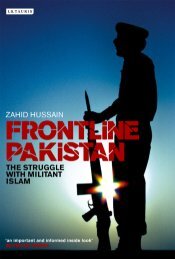US-Pakistan Relations: The Way Forward - Arz-e-Pak
US-Pakistan Relations: The Way Forward - Arz-e-Pak
US-Pakistan Relations: The Way Forward - Arz-e-Pak
You also want an ePaper? Increase the reach of your titles
YUMPU automatically turns print PDFs into web optimized ePapers that Google loves.
President Musharraf began to strike at the roots of extremism longbefore being approached by the United States following 9/11. Moreover, alarge majority of <strong><strong>Pak</strong>istan</strong>is do not share the Islamists’ vision of the future ofthe country and are concerned about the growth of extremism. Consider, for example,<strong><strong>Pak</strong>istan</strong>’s 2002 general election: <strong>The</strong> <strong><strong>Pak</strong>istan</strong> Muslim League (Quaid)and its allied parties that supported President Musharraf’s political ideology,won in three of the four provinces and were able to form a central governmentas well as three provincial governments. Conversely, the Muttahida MajlisAmal (MMA), a grouping of six religious parties, running on anti-Musharrafand anti-<strong>US</strong> platform, won its seats primarily within the Pushtun area of thetribal-dominated NWFP. According to Hussain Haqqani, “Despite the MMA’sunprecedented electoral performance in 2002, the alliance (MMA) garneredonly 11 percent of the total votes cast; the Islamist vote as a percentage of totalregistered voters has been more or less stagnant since the 1970s.” 11 <strong>The</strong> resultsof the election also reflect the pattern of support within the country for the waron terrorism; with a decisive majority supporting President Musharraf’s hardlineapproach.Not only does the ruling <strong><strong>Pak</strong>istan</strong> Muslim League support the war onterrorism, many of the opposition leaders, who sometimes criticize PresidentMusharraf on other issues, support him on countering terrorism. Notwithstandingthe force of his own personal commitment to the war on terror, PresidentMusharraf’s policies are well accepted throughout much of <strong><strong>Pak</strong>istan</strong> atlarge as well as within the political and military leadership.In contrast to the relationship between the United States and <strong><strong>Pak</strong>istan</strong>in the 1980s, current cooperation, although initiated as a result of the9/11 attacks, has developed along a more sophisticated agenda. Instead of aone-item agenda focused on the war on terrorism, <strong><strong>Pak</strong>istan</strong> has used the currentsituation of improved relations to pursue a broad series of issues. <strong>The</strong>policies pursued by the government of President Musharraf have proven to bein the best interest of both <strong><strong>Pak</strong>istan</strong> and the United States in both the shortandlong-term.This comprehensive approach consolidates national views related toglobalization, the eradication of militancy, economic development, and democratization.<strong>The</strong> <strong>US</strong> government has also genuinely sought to reduce <strong><strong>Pak</strong>istan</strong>’sforeign debt. Besides using its influence on G-8 countries for economiccooperation, the United States’was facilitated <strong><strong>Pak</strong>istan</strong>’s negotiations with theInternational Monetary Fund (IMF). America has also removed all sanctionsimposed on <strong><strong>Pak</strong>istan</strong> and has reassured the country’s leadership that its nuclearweapon capability is acceptable and will not result in future roll-backs. <strong>The</strong>United States and <strong><strong>Pak</strong>istan</strong> are also cooperating on matters related to nuclearnonproliferation, agreeing to resolve the proliferation issues involving Dr.90 Parameters













